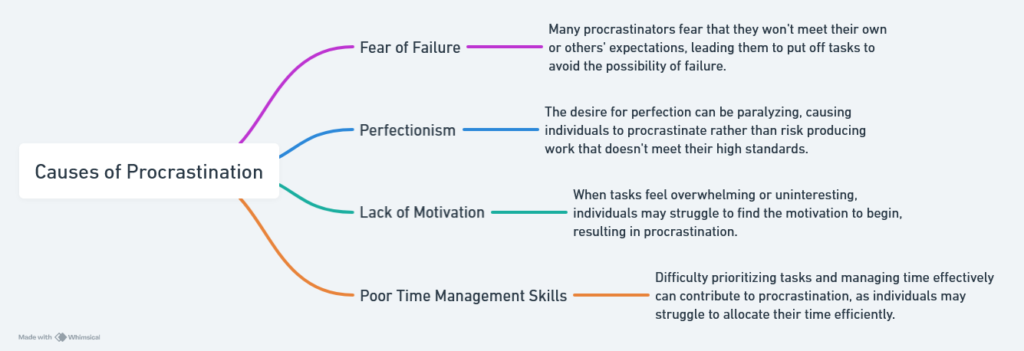Introduction
Procrastination, the art of delaying tasks or decisions, is a common phenomenon experienced by people of all ages and backgrounds. While it may seem like a harmless habit, procrastination can have detrimental effects on one’s productivity, mental health, and overall well-being. In this article, we delve into the psychology behind procrastination, exploring its causes and offering strategies to overcome this pervasive habit.
Table of Contents
Understanding Procrastination
At its core, procrastination is often linked to issues such as fear of failure, perfectionism, lack of motivation, and poor time management skills. The fear of not meeting expectations or making mistakes can lead individuals to avoid tasks altogether, preferring the temporary relief of procrastination over the potential discomfort of facing their responsibilities head-on. Additionally, procrastination can be reinforced by the brain’s reward system, as delaying tasks may provide a fleeting sense of pleasure or relief in the moment.
Furthermore, societal pressures and external influences can exacerbate procrastination tendencies. In a world where productivity is often equated with worth and success, individuals may feel overwhelmed by the sheer volume of tasks they need to accomplish. This can lead to a sense of paralysis, where individuals struggle to prioritize tasks effectively or even begin them at all.
Additionally, the pervasive culture of instant gratification, fueled by technology and social media, can make it even more challenging to resist the temptation of procrastination. Constant notifications and distractions can pull individuals away from their responsibilities, making it difficult to maintain focus and discipline. Therefore, addressing procrastination requires not only understanding its underlying psychological factors but also developing strategies to manage external pressures and cultivate a healthier relationship with productivity and success.

Causes of Procrastination
- Fear of Failure: Many procrastinators fear that they won’t meet their own or others’ expectations, leading them to put off tasks to avoid the possibility of failure.
- Perfectionism: The desire for perfection can be paralyzing, causing individuals to procrastinate rather than risk producing work that doesn’t meet their high standards.
- Lack of Motivation: When tasks feel overwhelming or uninteresting, individuals may struggle to find the motivation to begin, resulting in procrastination.
- Poor Time Management Skills: Difficulty prioritizing tasks and managing time effectively can contribute to procrastination, as individuals may struggle to allocate their time efficiently.

Overcoming Procrastination
While overcoming procrastination can be challenging, there are several strategies that individuals can employ to break free from this habit:
- Set Clear Goals and Prioritize Tasks: Break larger tasks into smaller, manageable steps and prioritize them based on importance and urgency.
- Create a Structured Schedule: Establish a daily or weekly schedule outlining specific times for work, breaks, and leisure activities to help manage time effectively.
- Use Time Management Techniques: Techniques such as the Pomodoro Technique, which involves working for a set period followed by a short break, can help improve focus and productivity.
- Challenge Negative Thoughts: Recognize and challenge negative thoughts and beliefs that contribute to procrastination, such as the fear of failure or perfectionism.
- Reward Progress: Celebrate small victories and accomplishments along the way to reinforce positive behaviors and motivation.

Conclusion
Procrastination is a complex behavior influenced by various psychological factors, including fear of failure, perfectionism, and poor time management skills. By understanding the root causes of procrastination and implementing effective strategies, individuals can overcome this habit and improve their productivity, mental health, and overall well-being. Remember, breaking free from procrastination is a journey that requires patience, self-awareness, and persistence, but the rewards of increased productivity and reduced stress are well worth the effort.
In the link below you will find an in depth article that shows what research has been conducted on procrastination and also delves into a deeper analysis on the subject.
https://www.ncbi.nlm.nih.gov/pmc/articles/PMC8847795/
For more articles you can click here, thanks for reading.





